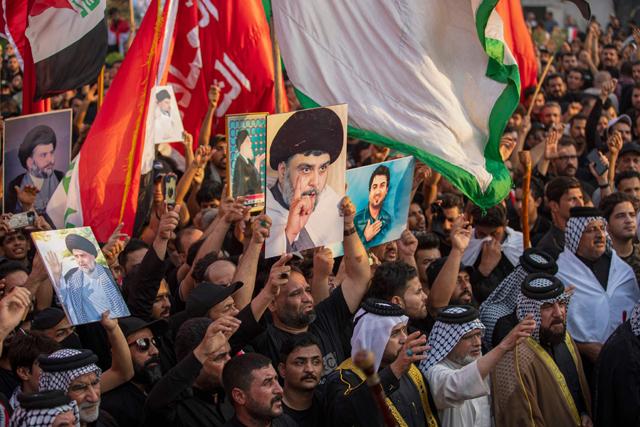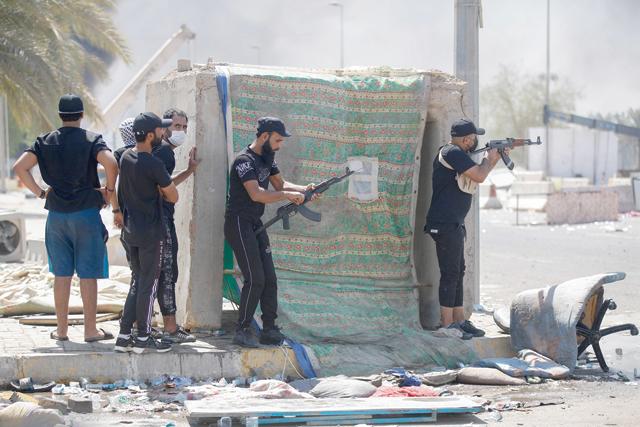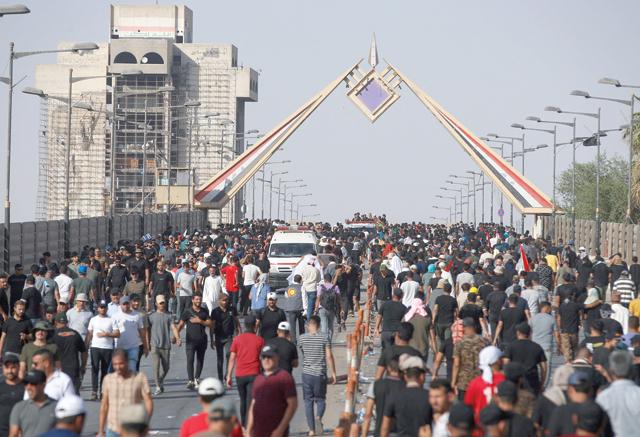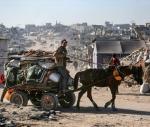You are here
Pro-Sadr protesters storm parliament in Iraq's Green Zone
By AFP - Jul 27,2022 - Last updated at Jul 27,2022
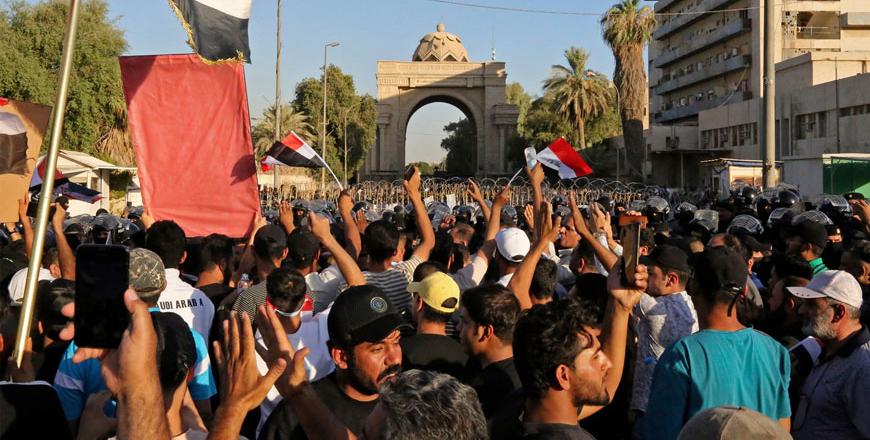
Supporters of Iraqi Shiite cleric Moqtada Al Sadr gather outside the main gate of Baghdad's Green Zone on Wednesday to protest against the nomination of Mohammed Shia Al Sudani for the prime minister position (AFP photo)
BAGHDAD — Supporters of powerful Iraqi cleric Moqtada Sadr on Wednesday danced and sang after storming parliament in the capital's high-security Green Zone, in protest at a rival bloc's nomination for prime minister.
Prime Minister Mustafa Al Kadhemi called on the protesters to "immediately withdraw" from the heavily fortified Green Zone, which is home to both government buildings and diplomatic missions.
The protests are the latest challenge for oil-rich Iraq, which remains mired in a political and a socioeconomic crisis despite elevated global energy prices.
Sadr's bloc emerged from elections in October as the biggest parliamentary faction, but was still far short of a majority and, nine months on, deadlock persists over the establishment of a new government.
Police fired barrages of tear gas in a bid to stop the protesters.
But state new agency INA said that protesters had "entered the parliament building", while Iraqi television showed crowds wandering around the building, waving national flags and cheering.
Kadhemi warned in a statement that security forces would ensure "the protection of state institutions and foreign missions, and prevent any harm to security and order".
Pro-Sadr officials went to persuade protesters to leave, an interior ministry official said.
An AFP correspondent in the Green Zone had earlier seen protesters carrying a fellow demonstrator who had been hurt.
Political crisis
Sadr's bloc won 73 seats in last year's election, making it the largest faction in the 329-seat parliament. But since the vote, talks to form a new government have stalled.
The protesters oppose the candidacy of Mohammed Al Sudani, a former minister and ex-provincial governor, who is the pro-Iran Coordination Framework's pick for premier.
The Coordination Framework draws lawmakers from former premier Nuri Al Maliki’s party and the pro-Iran Fatah Alliance, the political arm of the Shiite-led former paramilitary group Hashed Al Shaabi.
“I am against the corrupt officials who are in power,” said protester Mohamed Ali, a 41-year-old day labourer. “I am against Sudani’s candidacy, because he is corrupt.”
Iraq was plunged deeper into political crisis last month when Sadr’s bloc quit en masse.
Sadr had initially supported the idea of a “majority government” which would have sent his Shiite adversaries from the Coordination Framework into opposition.
The former militia leader then surprised many by compelling his lawmakers to resign, a move seen as seeking to pressure his rivals to fast-track the establishment of a government.
Sixty-four new lawmakers were sworn in later in June, making the pro-Iran bloc the largest in parliament.
Earlier this month, hundreds of thousands of Muslim worshippers loyal to Sadr attended a Friday prayer service in Baghdad, in a display of political might.
The huge turnout came despite scorching heat and the Shiite cleric not being there in person — an indication of his status as a political heavyweight, as well as a key religious authority.
The mercurial cleric’s sermon took aim at rivals from other Shiite factions.
“We are at a difficult... crossroads in the formation of the government, entrusted to some we do not trust,” Sadr said in the speech on July 15, read out by Sheikh Mahmud Al Jayashi.
Some factions have shown they are “not up to the task”, he added.
Sadr’s sermon took particular aim at the Hashed Al Shaabi, which has been integrated into the army, but is seen by many Iraqis as an Iranian proxy.
Hashed supporters last year protested near the Green Zone, demonstrating against what they said was vote “fraud”.
Related Articles
BAGHDAD — Thousands of Iraqis took to the streets of Baghdad Monday in counter-protests as rival supporters of Shiite Muslim cleric Moqtada
BAGHDAD — Iraqi supporters of powerful cleric Moqtada Sadr began withdrawing Tuesday from Baghdad's Green Zone after he demanded fighting en
BAGHDAD — Supporters of powerful Iraqi cleric Moqtada Sadr penetrated Baghdad's heavily fortified Green Zone on Saturday, occupying parliame


